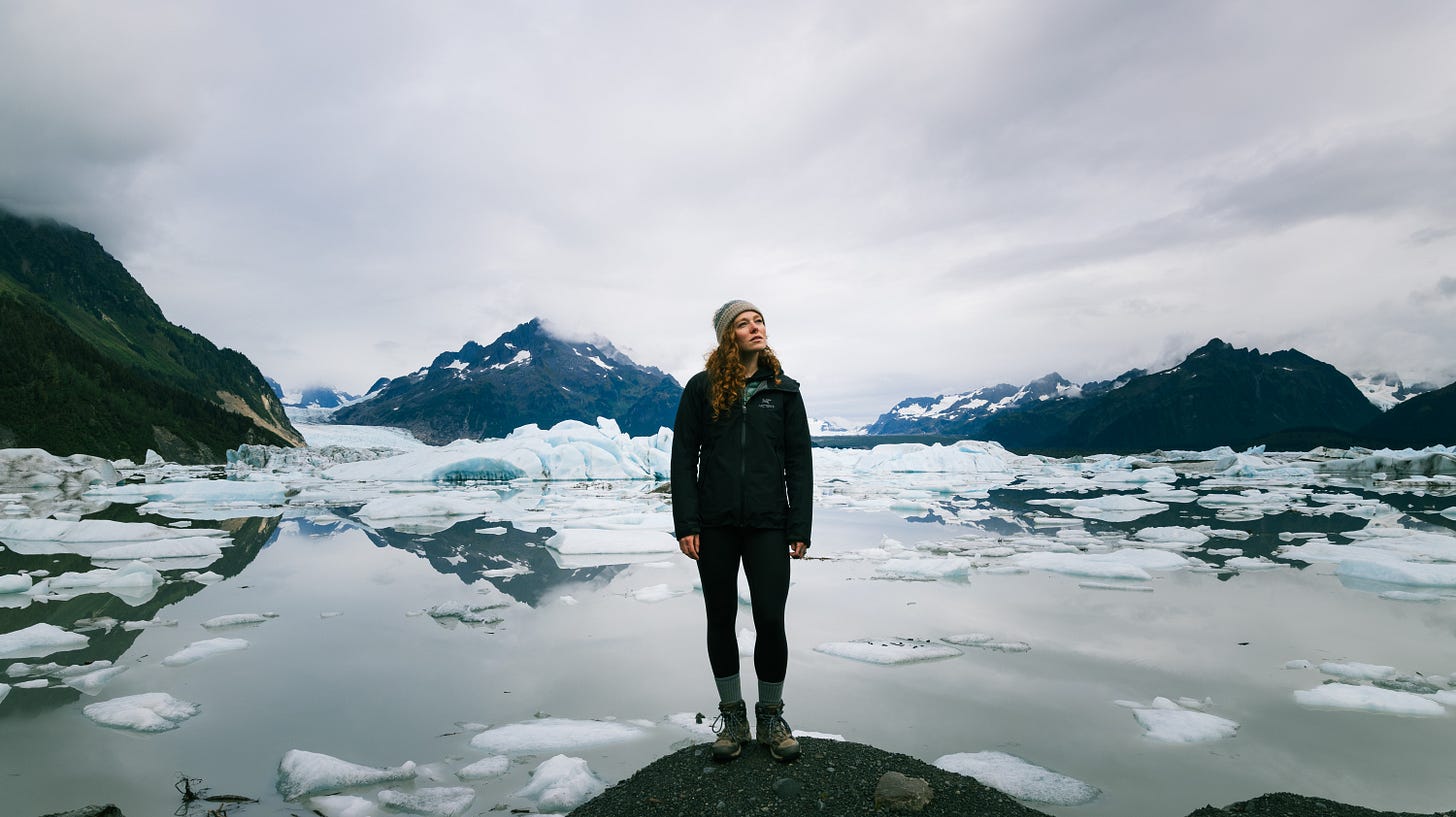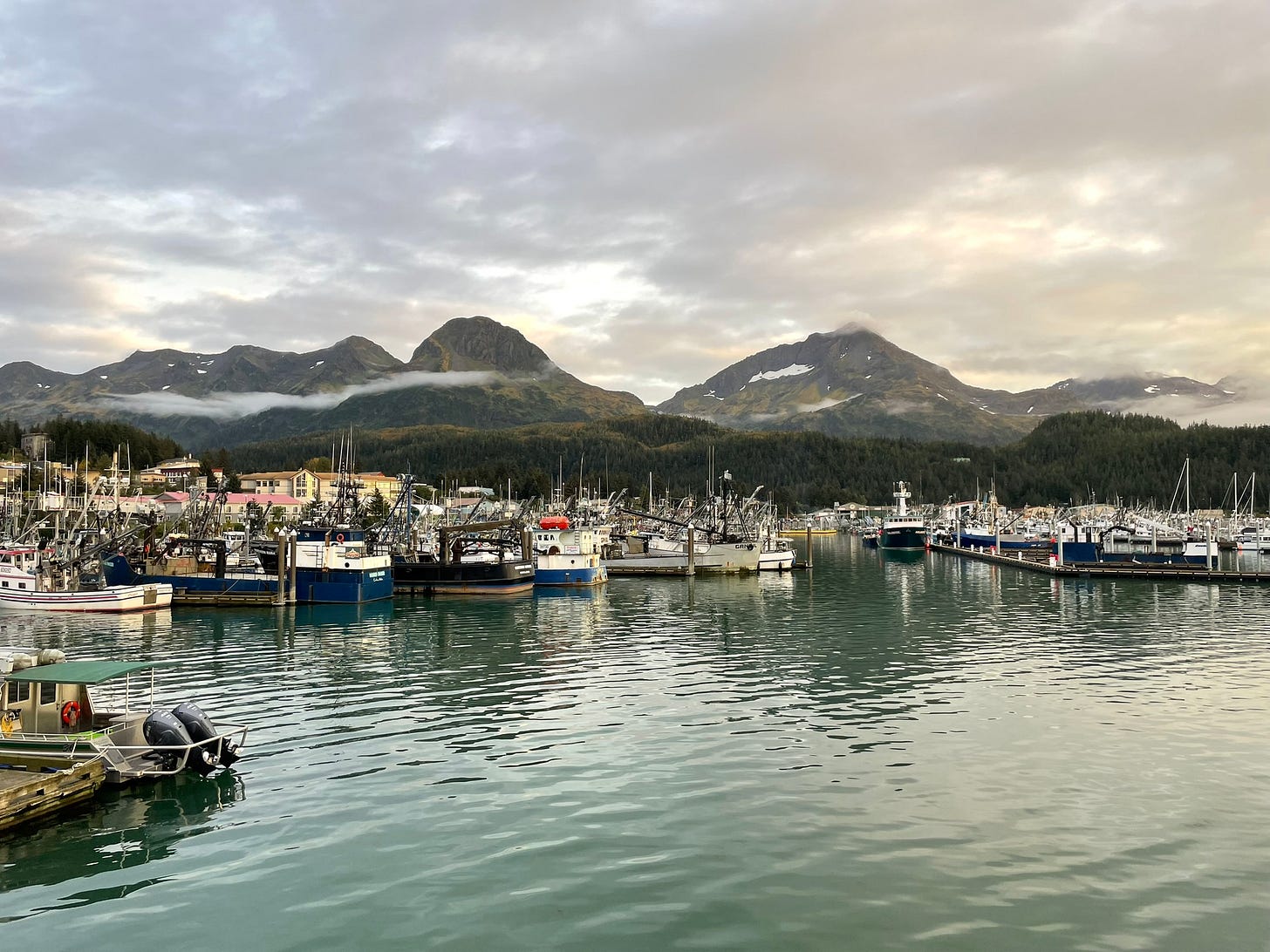🍃 Reciprocity: the interview
6 questions for Angie Kelly
Nature writer, n. A person who delights in paying attention, being astonished, and telling about it.1
“My nature writing and my experiences in these beautiful, harsh places have also inspired the world building and setting of my series of fantasy novels. It has helped me create a world I want to live in, and hopefully others will too.” ~ Angie Kelly
Welcome to Season 2 of the Reciprocity interviews. My inbox is full of treasure in the form of lovingly observed writing about place, encounters both wild and gentle, imaginative kinship and renewed reciprocity. These thoughtful, talented writers kindled in me the desire to learn more about them.
I love that today’s guest,
, is here to help greet the new year from a frozen land (although I wouldn’t be surprised if that photo was taken in August). Angie is a nature and fantasy author from Alaska. Her writing is enchanting, enlightening, and exhilarating. I was delighted to include her piece “Wild Devotional,” in the very first issue of NatureStack journal.2Her newsletter, The Selkie, is at the intersection of nature, myth, and fiction from a half-feral woman of the north.
Why are you drawn to nature writing?
Nature has always been an important theme in my life. It is the source of my spirituality, and I love connecting with the earth.
I was born and raised in a small community in coastal Alaska, one of the most beautiful and wild places in the world. I grew up hunting, fishing, and foraging wild berries. The subsistence lifestyle is important there. The town is so remote that meat and produce are extremely expensive. And when the land and sea have so much to give, it’s a little silly to depend on a grocery store to supply you with far less nutritious food than you can harvest yourself.
My connection with nature became ingrained at a very early age. Besides hunting and fishing, I spent many days hiking in the mountains with my mom, ice skating the frozen lake between the great icebergs of glaciers, and watching the northern lights dance over the stars. Up there, you’re steeped in the wild as soon as you step out the door.
Nature writing to me has been my attempt at an offering of gratitude for everything nature has given me. It’s my feeble attempt at expressing what I feel for the land and sea that feed and sustain us. And it has also become a way for me to connect with others who feel the same.
How does writing about nature affect you, in your work or personal life?
Writing about nature has improved my skill in writing overall. I often use what I see in the wilderness and the feelings it inspires as writing prompts, and you’ll see many of my Substack posts follow the same theme.
My nature writing and my experiences in these beautiful, harsh places have also inspired the world building and setting of my series of fantasy novels. It has helped me create a world I want to live in, and hopefully others will too.
On a more personal level, writing about nature feels like an active meditation for me. I often don’t know what I’m trying to say, or what my point is, when I start writing a piece. I just feel compelled to dig in and see what’s there, and, usually, I come out with some answers on the other side. Or at least I discover something about myself. It’s often cathartic, it helps me process the rise and fall of emotional tides we ride as human beings. Grief, love, frustration, longing, it’s all in there. Nature is my emotional sponge, and writing about it helps me make sense of myself.
While outside, have you ever experienced feeling small, lost or in danger?
Absolutely. I feel small almost every time I’m out in the wilderness, which is part of the great appeal of it in my mind. I don’t recall feeling lost often, but I have had many instances of feeling or being in danger. That’s another of the draws of being out there, putting yourself in the way of other beings, of forces greater than yourself. It’s an instant ego-check, and a good touchstone for our own mortality.
I spend a lot of time recreating in the mountains, especially back-country snowboarding, or split-boarding. It requires endurance, climbing huge mountains on the skis strapped to your feet, and a lot of awareness. There are few things that make you feel smaller or more in danger than when you’re miles from any road, way back in the peaks, and you realize the snow may not be as stable as you thought it was, and you need to cross an exposed piece of terrain. Exposure out there can refer to what’s above you, as in avalanches rocketing down from higher in the mountains, or what’s below you, like cliffs that you don’t want to accidentally go over. Sometimes, it’s both at once.
So while you’re expending yourself physically, you need to stay mentally sharp and aware, and look out for those you’re with as well. It’s a very grounding experience. It makes everything else melt away, because you have to just be there, in that moment.
I also used to work as a fisheries biologist in Alaska, specifically with wild salmon. My work put me in some of the most incredible and isolated places on the planet, but where there are spawning salmon, there are also, always, grizzlies. I personally never had an encounter go bad, but I had many heart-thumping, adrenaline spiked moments of “oh shit,” when accidentally coming face to face with a bear.
Interestingly, my longest bear encounter occurred with a black bear in northern Alberta. I think this one was too used to humans, and instead of running away at the sight of me, like they normally do, she started to walk toward me. I talked to her and pulled my bear spray, backing up in pace with her, but she kept advancing. It wasn’t until I held my ground, raised my arms, and shouted at her to “be a good bear and go away” that she left.
What’s a favorite memory of nature from your childhood?
There are so many, but the first that comes to mind is one of my earliest memories. When I was six, my dad and I were out on the water in his boat. It must have been either early spring or late summer, because the sun was setting, which it doesn’t do until the early hours of the morning in June, and then it just comes right back up again.
We came across a lone male orca, surfacing and swimming along the inlet. We watched him for a while, following at a distance. I remember the glassy surface of the water, the way it reflected the dark shadows of the mountain islands and the sunset pastels, how calm and quiet everything else was. How his great exhales shattered the surface and silence for a moment, then he slipped back beneath the water.
What do you hope for, for your writing?
I hope it makes people feel something. I hope it gives them a moment of connection, a life raft to cling to when they need it. Writing and fantasy did that for me as a child, and honestly, has continued to do that for me into adulthood. We need stories, as humans. It’s how we tell each other the truth, whether it is fiction or not.
My hope for my writing is the gifts it can give to others, the hope and grounding it can instill. And, selfishly, my hope is that it also continues to support me, both spiritually and career-wise. I hope to write books that people love, and to continue doing so for the rest of my life.
A writer or other creative artist who makes you hopeful for humanity and the earth.
, author of The Crow’s Nest on Substack, helps me remember that people all over the world still want to connect to their wild roots, and he is finding real ways to help people do it.Another non-writer artist is my fiancé, Levi Price. His gentle spirit and consistent optimism remind me that there is always love.
Each season, we donate 30% of paid subscriptions to a worthy environmental cause. This season, it’s the Center for Humans and Nature, where they explore what it means to be human in an interconnected world. Track past and current recipients here.
What did you enjoy most about this essay? I’d love to hear from you. Or share it with others by restacking on Notes, via the Substack app. Thanks!
Notes and links
If you’d like to participate in this interview series, please DM me on chat, or reach out via email: gabrielli-dot-julie-at-gmail. Find previous interviews here.
For more inspired nature writing and artwork from the best of Substack, check out the articles in NatureStack journal.
In further service to Substack’s nature writers,
curates this lovely directory of nature-focused writers:thanks, Mary Oliver









Thank you Julie, for this inspiring interview with Angie Kelly. And in another fun moment of synchronicity, I had just discovered Angie's writing in Notes yesterday, so prompted by your interview, I have just now subscribed to her Substack. Thank you for the beautiful questions that allow Angie's wild and adventurous spirit to shine through her responses. A delight to read❤️🙏🕊️
“Nature writing to me has been my attempt at an offering of gratitude for everything nature has given me….And it has also become a way for me to connect with others who feel the same.” I resonate with this deeply, and while I don’t exclusively write about nature, she’s always informing and grounding whatever theme I explore. This “finding our people” is a beautiful by-product of sharing/writing on topics that sustain us, and for nature lovers, since many of us are more introverted and prefer to wander the wild in solitude, this space to connect and learn from one another is invaluable. Thank you Julie, thank you Angie, for this lovely interview!